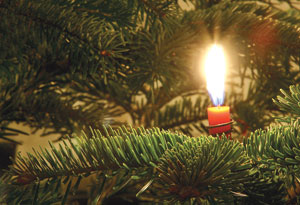
How many strands of mini string lights can you safely connect? How many inches should you cut from the base of a fresh-cut Christmas tree before placing it in water? Not really sure? Then it’s time to sharpen your holiday fire safety smarts with information and resources from the National Fire Protection Association (NFPA).
“Many people simply don’t know which activities and practices present hazards,” said Lorraine Carli, NFPA’s vice president of communications. “‘Project Holiday’ points out where holiday fire risks lurk, along with a wealth of tips and guidelines to prevent them.”
Across the board, the majority of holiday fires are the result of human error.
The holiday season is a time when there is an increased risk of home fires. NFPA is offering resources to help increase public awareness about fire risks during the holiday season, “Project Holiday” features a quiz that checks just how prepared you really are for a fire-safe season. The site also includes free, online videos and downloadable materials to help parents protect their families, particularly those with young children, who are at greater risk to fires. In addition, an online toolkit is available with campaign materials that can be used to spread the word about fire safety throughout the community.
Sparky the Fire Dog is also pitching in with holiday-themed fire-safety materials for parents and educators on his website, including downloadable coloring and activity sheets and e-cards.
According to NFPA, many holiday traditions and festivities – from candle decorations and cooking to Christmas trees and holiday lighting – significantly contribute to the season’s increased risks:
• December is the peak month for home candle fires. Almost half of all home decoration fires were started by candles.
• Although Christmas tree fires aren’t common, when they do occur, they’re more likely to be serious.
• A heat source too close to the tree causes roughly one in five associated fires, with one of every three home Christmas tree fires caused by electrical problems.
• Almost half of all holiday lighting fires occur in December. Electrical failures or malfunctions were a factor in two-thirds (69 percent) of these fires.
• Cooking is the leading cause of home fires; unattended cooking is the leading cause.
To learn more about “Project Holiday” and its tips for a fire-safe season, visit www.nfpa.org/holiday.
NFPA is a worldwide leader in fire, electrical, building, and life safety. The mission of the international nonprofit organization founded in 1896 is to reduce the worldwide burden of fire and other hazards on the quality of life by providing and advocating consensus codes and standards, research, training, and education. NFPA develops more than 300 codes and standards to minimize the possibility and effects of fire and other hazards. All NFPA codes and standards can be viewed at no cost at www.nfpa.org/freeaccess.
















Reader Comments